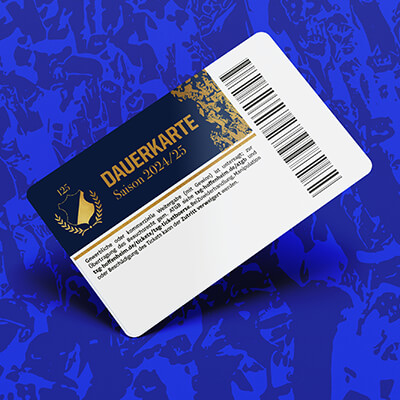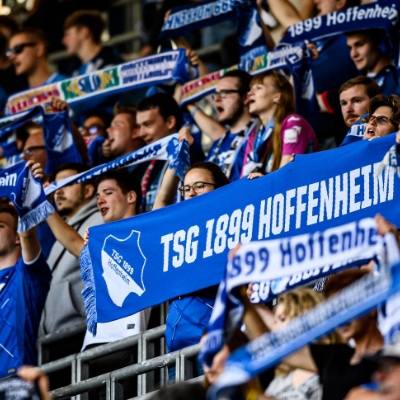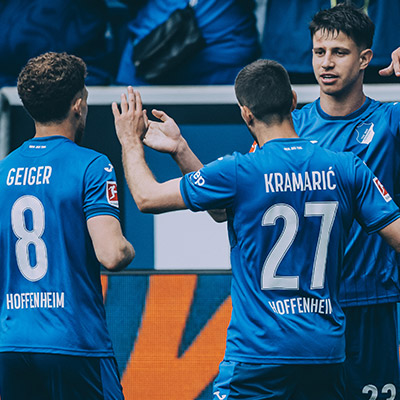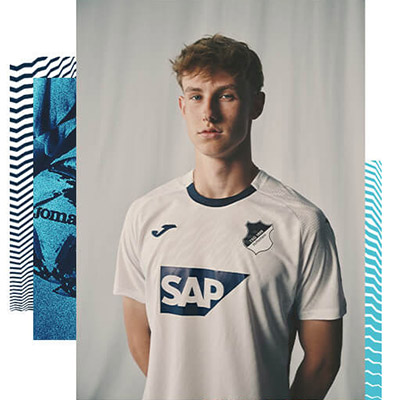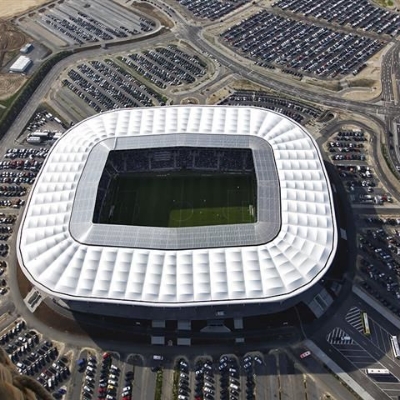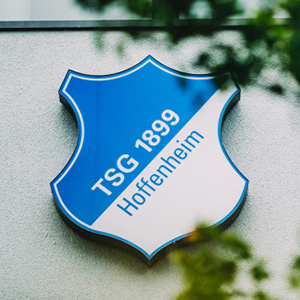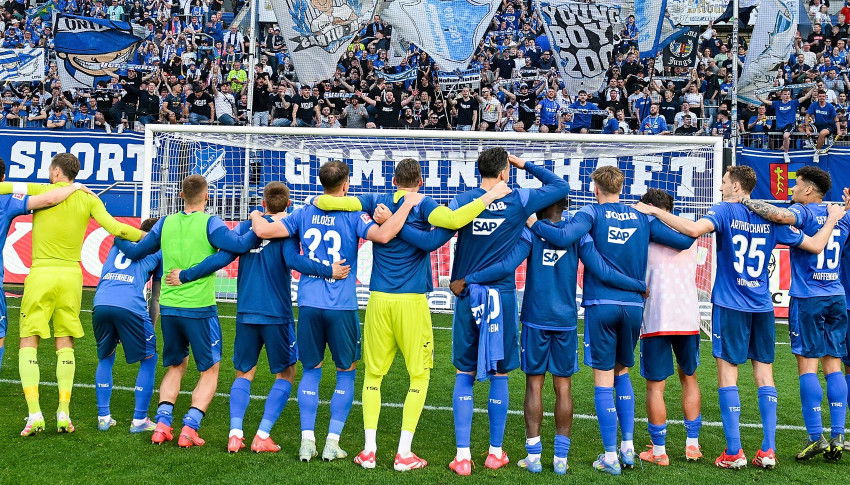"I want to give the fans something back"
Georginio, we're meeting at your hairdresser's in Sinsheim. Your hair is a real sight to behold. How long have you styled it this way?
"When I was small, I had very long hair – almost shoulder-length. I wore braids back then. But then the other children teased me and said that I looked like a girl. So I got my hair cut off."
Did you cut your hair yourself?
"No, I couldn't have done that. (laughs) My mother did it to begin with, then later on I went to the hairdresser."
How much time do you take to do your hair in the mornings?
"It varies a lot. Sometimes I don't do anything and just leave my hair the way it is when I get up. I'm not particularly vain. But today, of course, I made myself look extra nice for the photos." (laughs)
On the pitch, you stand out not only for your hairstyle but for your footballing abilities too. Did you expect to have so much success at TSG right away?
"I didn't have that much time to think about it. It only took three minutes to score a goal in my first competitive match against Werder Bremen. That was obviously the perfect start. I've settled in incredibly well here; things couldn't be going better for me."
Last season, you sometimes played for TSG's U23 team in the Regionalliga Südwest. How important was it for you to get that playing time under your belt?
"I hadn't played a full 90 minutes for a long time because I was often on the bench at Stade Rennes. That's why we initially planned for me to stay with the Hoffenheim U23s for longer, but Sebastian Hoeness was quickly convinced by me and regularly included me in the Bundesliga squad early on. But the time with the reserves was enormously helpful. In part because there was another Frenchman in the team, Gautier Ott, who was also able to help me with the language at the beginning. That made it a lot easier for me to settle in."
What made you want to move to TSG and a foreign country in the winter of 2021?
"The sporting prospects had me convinced. After the initial contact, I watched a few games and said: 'Yes, why shouldn't I give it a go?' I really wanted to play for a club that was a bit smaller by comparison so that I could actually play regularly. Playing time and sporting prospects are more important to me than just sitting on the bench at a club. Then the talks with the people in charge went so well that I immediately wanted to go to Hoffenheim. And now I might even be playing in the Champions League with TSG soon. That would be perfect.
But for an 18-year-old, it can't have been an easy feat to leave Stade Rennes and move to Germany on your own...
"There was a lot of maturing to be done and there were many changes. At the start, I was all on my own and away from my parents for the first time. My entire social circle was suddenly no longer there, my life had completely changed. But on the other hand, it helped me out and made me grow up faster. I now live with my girlfriend in Neckargemünd and we feel very comfortable here."
What do you miss most from your homeland?
"My friends and family, plus the beach and the food. My mother is the best cook in the world. She cooks the most delicious dishes, some of which you can't get in Germany. (laughs) But my parents have visited me a few times. That's always a special occasion and, of course, they cook for me then."
Not only culturally but in sporting terms too, there are differences. What is the biggest footballing difference between the French and German leagues? (thinks long and hard)
"It's always end to end in the Bundesliga, one counter-attack after another. That means you have to run a lot more. Meanwhile in France, the game is more physical and you have to be a bit more robust to assert yourself. But in the Bundesliga, much more can happen in every situation; the games are always a bit wild. In France they would say: folie (editor's note: mad, crazy). There are a lot of goals and you never know who will win."
You often have an interpreter translating but you understand almost all the questions. How are the language classes going?
"They actually went pretty well to begin with, but unfortunately I didn't speak German during my summer holiday and I forgot almost everything. (laughs) But I'm still taking video lessons diligently and am learning a lot. When people don't speak too fast, I understand almost everything. It's like football: if you practice every day, you'll get better and better."
You have impressed on the pitch in Hoffenheim and have won the hearts of the fans. Were you surprised that you became a fan favourite so quickly?
"A little bit. I can't really say what that's down to; that's one for the fans to answer. They probably like the fact I laugh a lot. That's just how I am, I got that from my parents. I often ask myself: 'Why should I be sad?' There's hardly any reason to be; I'm doing so well, I should always be laughing. If it goes down well with the fans, then even better. I wasn't used to playing in front of so many people. My first steps in professional football were during the Corona pandemic. Then being in the stadium, hearing your name sung by the spectators and seeing fans wearing your jersey is something very special. That of course put me in a good mood. But they were special experiences that I'm very grateful for, so I want to give something back to the fans."
You have your first name, Georginio, on your jersey, rather than your surname Rutter. How did that come about and how do you like to be called?
"I prefer Georginio. I already had it on my jersey at Stade Rennes and that's why I was also allowed to carry it over into the Bundesliga. My father always said to me that it would be a better fit for a footballer. He always dreamt that I would make it as a professional one day and is now very happy to see me in this jersey and to read my name. I'm happy about that and I also think that this name is a better fit for my style."
Was there a point in time when you realised you could make it as a professional footballer?
"No specific moment currently springs to mind, but when I was 14 years old I started to think: 'This could work out.' When I was 16, the people in charge at Rennes also told me I had what it takes to turn professional. My father had always predicted it."
Was this love of playing already a driving force and strength in your youth?
"First and foremost it's about winning, of course. We play football to be successful. But equally, the fans are also a factor. We want to make them happy. And we players also need to feel good. I enjoy being on the football pitch every day. That was the case beforehand as well and I want to prove it with my style of play."
What do you see as your greatest strengths?
"My qualities are in one-on-one situations. I can outsmart many opponents with my pace. I'm not afraid to lose the ball. These are all attacking qualities that are attractive in football. But I still have enough things to improve. I still don't time my headers right. Sometimes I'm a bit too hasty, but that's probably due to my age. I always get a lot of praise and encouragement from the coaching team. That strengthens my resolve to keep working on myself.
You've scored goals with your left foot, your right foot and your head this season. What's your stronger foot?
"I think my left." (laughs)
Which foot do you take penalties with?
"With my left foot. But I've already scored four goals this season with my right foot. I also feel enormously confident with my right. So I would say that I'm two-footed but a little stronger with my left."
As a young player, you still have room for development. Which of your team-mates takes you to one side and gives you tips?
"Everyone takes really good care of me, but if I had to single one of them out, it'd be Munas Dabbur. He's experienced a lot in professional football and always supports me. When I miss a chance, he immediately comes up to me and gives me encouragement. Munas knows what I need. I appreciate that very much."
You're not only friends and team-mates, but rivals for a place in the starting XI as well. How do you deal with the fact you're sometimes only on the bench?
"I am still young and can put it all into perspective. We're immensely strong in the attacking department. Munas, Andrej, Ihlas and Jacob all deserve to start. Of course, it's frustrating on the day itself when I'm not in the starting line-up, but then I just do my best to try to show that I belong in the starting line-up."
That said, you've been the only player in the squad to play in every competitive game. What does that mean to you?
"First of all, it means that I've not yet been out injured. That's obviously hugely important for my development. In addition, my appearances serve as vindication that I'm doing well overall and the coach is obviously happy with me. That's the most important thing."
The coach is not the only one happy with you: you've prematurely extended your contract with TSG until the summer of 2026. What were the reasons for that?
"The club gives me the feeling they need me. I feel an extremely high degree of trust from everyone involved. That gives me a sense of security that allows me to work calmly. This in turn allows me to produce my best form on the pitch and play an important role for the team. This appreciation helps me enormously."
Things are going pretty well this season. Given your current position in the standings, what do you think the team can still achieve in the home straight?
"Almost everything. We still have seven games to go. The table is incredibly tight, so it's difficult to judge now where we'll end up. We of course want to play European football next season. That's what we're fighting for and we've put ourselves in a good position."
The interview appeared in the April edition of SPIELFELD magazine.





